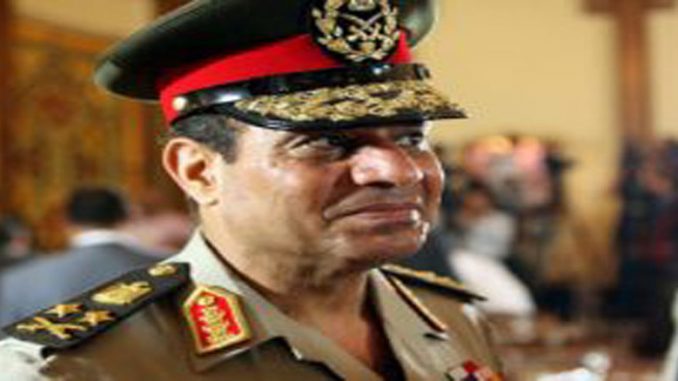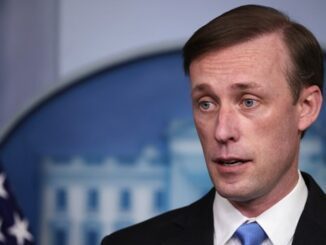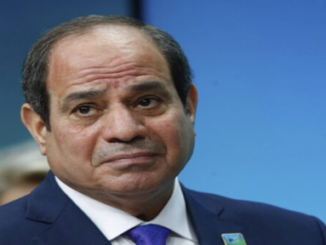
Ahead of a farcical election, Abdel-Fattah al-Sisi goes after the press. His tone has turned dark, with threats and talk of conspiracies.
Egypt’s Abdel-Fattah Al-Sisi could not ask for a better mouthpiece than Khairy Ramadan, a talk-show host. When activists started a Twitter campaign to mock the president, Mr Ramadan proposed banning the social network. And like Mr Sisi he calls the revolution of 2011, when the previous strongman, Hosni Mubarak, was overthrown, a foreign plot, The Economist said in an article on March 8.
But during his show on February 18th, Mr Ramadan talked of a police colonel who earns 4,600 pounds ($261) per month. To supplement his income, the colonel’s wife sought work as a cleaner. Mr Ramadan, who confessed to having a “soft spot” for the notoriously brutal cops, wondered why they were paid so little. He can now ask them directly. Apparently seen as disrespectful, on March 3rd he was arrested.
Later this month Egyptians will go to the polls to re-elect Mr Sisi. The outcome is all but certain. Serious challengers were arrested or coerced into dropping their bids. His sole opponent, Moussa Mustafa Moussa, was dragooned into service hours before the registration deadline to avoid the embarrassment of a one-man race. Mr Moussa refuses to take part in a televised debate, calling it an unacceptable “challenge” to the president.
Yet on the eve of his victory, Mr Sisi seems fearful rather than confident. Egyptians whisper about palace intrigues, such as the sacking of Khaled Fawzy, the intelligence chief, who has not been seen since January. The reasons for his dismissal and apparent detention are unclear. Mr Sisi’s tone has turned dark, with threats and talk of conspiracies. He often refers to the “forces of evil” arrayed against Egypt.
One of them is apparently a staid British broadcaster. The BBC caused an uproar when it aired a short documentary on torture and forced disappearances in Egypt. In response Nabil Sadek, the public prosecutor, vilified foreign journalists. The state suspended co-operation with the network (not that it was terribly co-operative in the first place). One of the alleged victims, Zubaida Ibrahim, was trotted out on local television to deny she was ever tortured. Then her mother was arrested. Her lawyer has vanished.
In the first years after the revolution, Egyptian journalists enjoyed a moment of freedom. But they closed ranks in 2012 after the Muslim Brotherhood was voted into office. Like much of the elite, journalists largely opposed the Islamist group. So the press broadly supported the coup in 2013 that brought Mr Sisi to power.
Predictably, it became his next target. Egypt consistently ranks near the top of countries in numbers of journalists imprisoned. Earlier this month two were arrested while preparing a report on Alexandria’s historic tramway. Mr Sadek has ordered his staff to monitor the media and press charges against anyone who “harms national interests”. Newspaper editors may be forced to attend indoctrination classes at a military academy. Though the constitution enshrines freedom of speech, criticism of the security services is off-limits. “Defaming them, legally, for me now equals treason,” Mr Sisi said recently.
A growing number of journalists may actually work for the security services. Two satellite channels are run by former military-intelligence officers. In December a private-equity fund with links to the government consolidated its hold on several media outlets, including…, a popular television channel, and….., a widely read newspaper. Reporters Without Borders, a pressure group, said last year that it was worried about “the regime’s domination of the media”.
Mr Ramadan has been released on bail, though he still faces criminal charges. His detention sparked protest from even normally obedient members of the press. Criticism of the absurd election is surfacing, too. Last month Mr Moussa was interviewed by Lamis al-Hadidi, another television presenter. She asked whether his family would complain about his plans to spend 20m pounds on an election he cannot win. “You can withdraw before March 1st, so they won’t be upset,” she advised. Thankfully for her, Mr Moussa is not a police officer, merely a stooge running for president. Insulting him is no crime.



